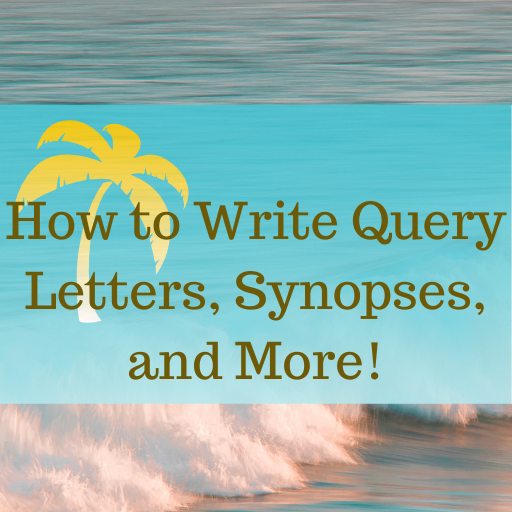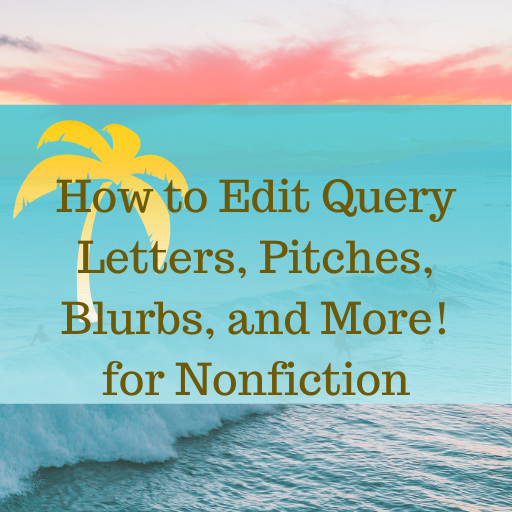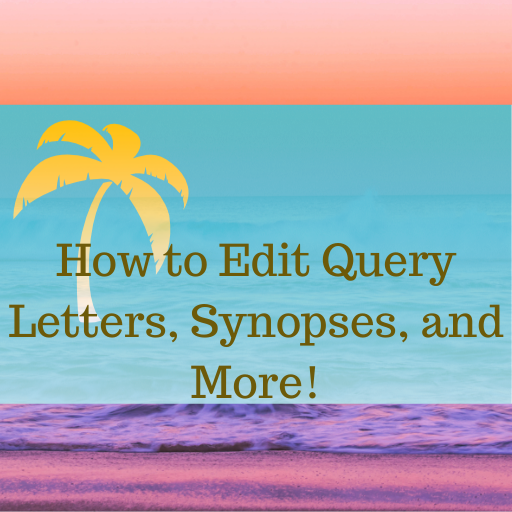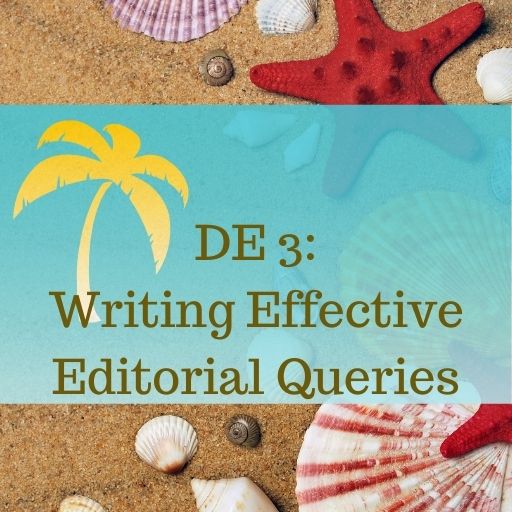Query Letter Basics
Both editors and authors need to learn query letter basics to help with the best possible chance of book publication.
Query Letter Basics For Editors & Authors
If your author-client is interested in trying to have their novel published by a traditional publisher, you may be asked to look at the author’s query letter (also called a pitch letter). Query letters are easy to get wrong, so here are some tips for making sure your author hits the mark.
The pitch needs to consist of a description of the story, details about the manuscript itself, and a little bit about the author.
- Who is the main character (or characters)?
- Why should we care about him/her/them?
- What is the story about? What is the conflict? What are the stakes?
- Where does it fit in the market? Does the pitch demonstrate that the author knows the genre?
- Who is the author?
That’s a lot to do in 300 words or fewer. At the same time, the query letter has to get the attention of people who have fifty-seven other things to do this minute, so the author can’t waste any time on throat-clearing.
The opening paragraph of the query should include the hook – why readers would want to read the book being pitched. A hook isn’t a description of the genre or characters. It’s common for authors to say something like, “My romance has a smart, sarcastic heroine and an unexpected hero.” But that’s not a hook, it’s just a description. A hook is along the lines of:
When single mother Trey Ferguson meets widower Michael Manning, every instinct tells her this is one stray she shouldn’t take in. But with his slow sexy smile and sad brown eyes, how can she resist?
The next paragraph should dig into what the story is about, including its conflict. The author also needs to include the title of the novel, its length and genre, and the fact that the full manuscript is complete. Many times writers try to pitch incomplete novels but unless the author is already an established novelist, an agent or acquisitions editor is going to need to see the complete manuscript to make a decision.
Finally, the author should close with pertinent information about their work as a writer. Other published books should be mentioned (even if they’re not in the genre of the novel being pitching). If the novel is about DEA agents, and the author is a DEA agent, that should be mentioned. If the author has won an important prize or recognition for their writing, that should be mentioned, too. If the author doesn’t have much to say here, they can mention that they’re a member of a writing organization or two, which shows they’re trying to be professional.
(I always found that members of the Romance Writers of America tended to have better romance manuscripts than non-members, probably because the RWA makes an effort to educate members on craft, professional behavior, etc. So that was always a plus in the writer’s column, even if the writer had nothing else).
The author shouldn’t say, “I’ve never been published,” “I don’t know what I’m doing,” “This is my first feeble attempt to get published.” The author should be professional and confident.
The query letter should close with an offer to send the full manuscript and synopsis for the agent or acquisitions editor’s review. It should also include the author’s contact information, including phone number and email address.
Query Letter Basics: Query Letter Must-Haves
In the course of my career as an agent and later as an acquisitions editor, I encountered a number of common mistakes in query letters. Don’t let your author make these!
- What is the title of the book? People forget to give this!
- When authors query via email, they need include their actual name in the letter. As an acquisitions editor, I often received emails from addresses like qrst@gmail.com but if the writer didn’t sign her name to her email, I had no idea who was writing to me. Who you are should not be a secret.
- Check for misspellings, typos, grammar errors, and the like.
Five Approaches That Don’t Work in a Query
- Telling about the author and not about the book.
- Describing the theme of the book (“it’s about love and hate”) and not the conflict and story (“Joan is trying to escape the law, and Michael is trying to track her down”).
- Telling all the nitty-gritty details of who did what (save that for the synopsis).
- Sounding defensive or attacking (“I know no one in the liberal media will want to publish my novel about religious faith, so here goes nothing. . . .”)
- Using vague generalizations instead of specific information (“Lots of people will be interested in reading this book, because lots of people like mysteries.”)
Don’t Do This—Or Learn From My Mistakes!
You’d think after all my years in the biz, I’d know better. But some years ago, I finished writing a mystery and wanted to query it. And here is my terrible, terrible query:
Dear Ms. NAME:
I recently completed an 80,000 word mystery, Second Acts, which I believe is right for YOUR COMPANY.I’m a professional writer with more than twenty-five nonfiction books published. My most popular book, Dojo Wisdom (Penguin Compass), won an outstanding book award from the American Society of Journalists and Authors. My first novel, Then Will Come Night and Darkness, was published by Xenos Books earlier this year. My essays have appeared in many magazines.
As per your guidelines, I’ve attached a brief synopsis and the first three chapters of Second Acts. I would be delighted to send the complete manuscript for your consideration.
Yours,
Jennifer Lawler
Oh, I cringe even to share that, but I feel the cause is worthy. You can see where I went wrong, can’t you? Where is the information about the actual novel?
Effective Query Letter Sample
I did figure out where I went wrong, and I did sell the novel. But not to the person I sent that query to.
Sample Query
Here’s a query I didn’t screw up. It was for the first romance I’d ever written and it sold:Dear NAME:
I recently completed a 53,000 word romance, Love by Design, which I believe is right for Avalon.Tess Ferguson has a weakness: taking in strays. She’s a seamstress who dreams of becoming a fabric designer – but she’s also a single mother with more practical matters on her mind.
When Tess’s sister-slash-boss, Greta, an interior designer, is laid up after knee surgery, Tess must be her go-between with Michael Manning, the sweet, sexy owner of a carpentry business. Tess is attracted to Michael’s calm, quiet strength, but she’s convinced he’s just one more stray destined to cause her trouble.
Michael is drawn to Tess, whom he finds warm, open and likable. But her curiosity and persistence in asking questions he doesn’t want to answer threaten his hard-won peace. By burying himself in his work, he can forget about the shocking death of his wife and unborn son – and the unhappy secret she left him with.
I’m a professional writer with more than twenty-five nonfiction books published. My most popular book, Dojo Wisdom (Penguin Compass), won an outstanding book award from the American Society of Journalists and Authors. My first novel, Then Will Come Night and Darkness, was published by Xenos Books earlier this year. My articles and essays have appeared in numerous magazines, such as Family Circle.
As per your guidelines, I’ve attached a brief synopsis and the first three chapters of Love by Design. I would be delighted to send the complete manuscript for your consideration.
Sincerely,
Jennifer Lawler
These days, I would probably start with “Tess Ferguson has a weakness…” and include the manuscript details a bit later in the query, but this worked fine. Your author shouldn’t feel that the query letter has to follow a template exactly—just be sure all the relevant information is included, and that the story description will engage the agent’s or editor’s attention (easier said than done, of course!)
Tips for Editors & Writers
The Fine Art of Copyediting Fiction
When copyediting fiction, it’s common to run up against issues that pit author preference against standard editing approaches. For example, in a story I wrote some years ago, the main character’s neighbor is referred to as “3-B” as that is her apartment number and the MC doesn’t know her name. Fine. She can be referred…
Let the manuscript teach you how to edit it
One of the lessons I’ve learned over many years of editing is that you have to let the manuscript teach you how to edit it. Every manuscript is different and every manuscript needs a different touch. Even when an author does something I’ve seen many times before, I have to edit for that particular manuscript,…
Helping Authors Strengthen Story Settings
The setting of a novel consists of multiple elements, big and small, that nest inside each other like those little Russian dolls. We might show this hierarchy of settings like so: If you think about it, the micro setting of “the living room of 601 San Mateo Road Apartment 16” implies the existence of all…
Join the Club!
New to story editing? Begin at the beginning.








